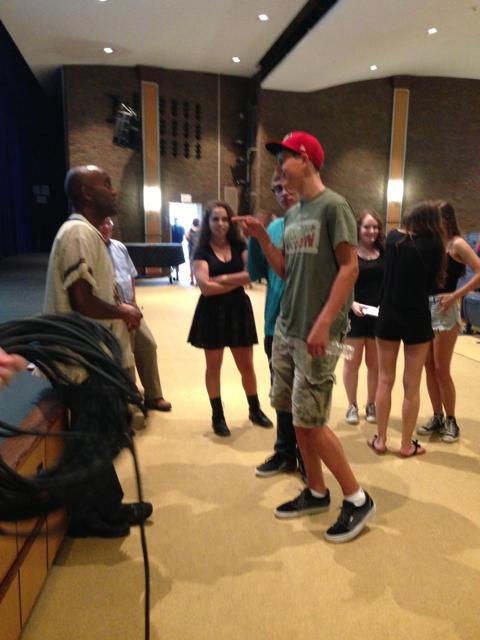Hit the turbo button on your life. This is the message Mawi Asgedom wanted us to take away from his visit to Hills on our third day into the new school year. As the author of our 2013 summer reading book, Of Beetles and Angels, students likely expected Mawi to retell his life story, aka summarize the book. He surprised us.
Mawi shared with us the director’s cut extras. He didn’t focus on his exodus story or the memories of life as a refugee. He fast-forwarded to the teenage years and what is relevant to our lives now. He advised us to “make each day count.” His deepest regret is that he was ever ashamed of his family and his background. As he grew up he learned to share the things that made him different, even embracing his heritage by performing an Ethiopian shoulder dance at Harvard’s culture day. Want was the moral of the story? Don’t be afraid to be different, an idea Mawi captures in Of Beetles and Angels.
So for those who still haven’t read it, the book takes you on Mawi’s journey from a Sudan refugee camp to the US and Harvard. The morals of this “remarkable journey” are never give up and be kind to others. The latter serves as the title of the book, which comes from a saying Mawi’s father had: “treat all people – even the most unsightly beetles – as though they were angels sent from heaven.” The subject of his address focused on overcoming challenges.
At any point in our lives, an obstacle can take over. It becomes impossible to see anything else. For Mawi, the toughest challenge was how to live while his brother did not. He had no hope for the future. Mawi demonstrated this for us by placing his hand in front of his face and asking us to do the same. What does one do when they are consumed by something life altering? Say “I still believe this is possible,” keep acting like there is a way for things to get better. When things get to be too much you just have to “muddle through and survive each day.”
Mawi has published eight books, but Of Beetles and Angels really put him through the ringer. Just out of Harvard and living in an Illinois apartment, Mawi’s manuscript existed on his computer and a back-up zip drive. Both were stolen during a robbery. All his hard work, lost. He could have given up. He didn’t, he was willing to see beyond this obstacle and rewrite a 150-page book. Even when something appears to be blocking your way, Mawi urged us to “continue to do [our] best.” No matter what the circumstances, life will go on. Mawi’s message: “keep working towards [your dream].”
The advice Mawi had to offer was inspired, but what made him unique was his perspective. His honesty was refreshing. When asked if his story would have been as well received had he not gone to Harvard? Without hesitation he answered, “No.” Mawi had no plans for what to do after Harvard. He became a public speaker: “I’m doing this stuff because I want to do it.” Mawi uses his journey to teach others. He values life as the most important gift to be given and wants young people to do so also.
What’s the easiest way to jumpstart your life? According to Mawi, “Do something in the next 48 hours,” don’t allow something as important as life to pass you by. So Mawi and I implore you to hit that turbo button and show up to your life.









































